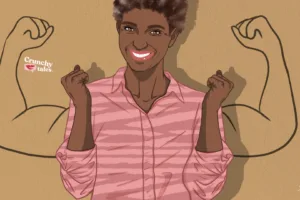8 Essential Movies To Binge Watch In Your 50s
If a picture may be worth a thousand words, how about a movie? Maybe even more than that. It could be a powerful, transformative catalyst. According to several counsellors, who prescribe doses of ‘cinematherapy‘ to help their patients explore their psyches, watching certain movies can activate areas of the brain associated with emotional processing, reflection, problem-solving, and empathy. Movie themes can resonate deeply with people, allowing them to better reflect on themselves and their circumstances, and even shift mood states. They can potentially open a person’s eyes to new solutions to any number of difficulties and may provide many therapeutic benefits in addition to entertainment. They might offer hope, suggest role models, and reframe problems. Some individuals might also be more likely to realise the presence of certain issues in their relationships and personal life when they first experience them in a movie.
Cinematherapy for grown-up souls
If you’re more the introspective type and find yourself pondering the questions of life (“Is that all?” or “Now, what?”), you might find some help knowing others have made it through this difficult time. At least on the silver screen. Far from suggesting a proper cure for your grown-up malaise, here are some of the crunchiest movies about midlife you can watch to keep yourselves going while stuck in your home.
Eat, Pray, Love (Ryan Murphy, 2010)
Liz Gilbert (Julia Roberts) thought she had everything she wanted in life: a home, a husband and a successful career. Now newly divorced and facing a turning point, she finds that she is confused about what is important to her. Daring to step out of her comfort zone, Liz embarks on a quest of self-discovery that takes her to Italy, India and Bali.
Why we love it: it’s the idea you can be in charge of your life, make changes you want to make and be the hero of your own story
Thelma & Louise (Ridley Scott, 1991)
Meek housewife Thelma (Geena Davis) joins her friend Louise (Susan Sarandon), an independent waitress, on a short fishing trip. However, their trip becomes a flight from the law when Louise shoots and kills a man who tries to rape Thelma at a bar. Louise decides to flee to Mexico, and Thelma joins her. On the way, Thelma falls for sexy young thief J.D. (Brad Pitt) and the sympathetic Detective Slocumb (Harvey Keitel) tries to convince the two women to surrender before their fates are sealed.
Why we love it: great performances and dramatic scenes, this is one truly amazing film that crystallizes a moment in feminist social history for all time. It’s is an updated, feminized version of an outlaw road movie.
It’s Complicated (Nancy Meyers, 2009)
Jane (Meryl Streep), a successful restaurateur, has been divorced from Jake (Alec Baldwin) for many years, although they remain friends. When an innocent meal together turns into an affair, Jane finds that she is the other woman in the now-remarried Jake’s life. Meanwhile, Adam (Steve Martin), an architect hired to remodel her kitchen, is still stinging from his own divorce. He finds himself falling in love with Jane but soon realizes that he has become part of a triangle.
Why we love it: Divorce is tough, relationships after divorce are sometimes even tougher, laughing about it is key to getting on with life.
The Bridges of Madison County (Clint Eastwood,1995)
A moving love story about a photographer (Clint Eastwood) on assignment to shoot the historic bridges of Madison County. He meets a housewife (Meryl Streep), whose husband and children are away on a trip, and the film traces a brief affair that is never sordid but instead one of two soul mates who have met too late.
Why we love it: as good as Eastwood is, however, it’s his co-star, Meryl Streep, who really shines. The two of them construct their performances not out of grand gestures, but out of countless subtle little moments of growing love; a time comes when they are solemn in the presence of the joy that has come to them.
While We’re Young (Noah Baumbach, 2014)
Middle-aged filmmaker Josh Srebnick (Ben Stiller) and his wife, Cornelia (Naomi Watts), are happily married, but stuck in a rut. So, when free-spirited couple Jamie (Adam Driver) and Darby (Amanda Seyfried) enter their lives, it’s like a breath of fresh air — especially for Josh, who pines for a youth he wishes he had. Soon, Josh and Cornelia are ditching friends their own age to hang out with the hipsters — but whether the friendship can endure despite a 20-year age gap remains to be seen.
Why we love it: the film is about the desire of every generation to usurp the position of another, whether it’s the one after or the one before you.
Kramer vs. Kramer (Robert Benton, 1979 )
On the same day Manhattan advertising executive Ted Kramer (Dustin Hoffman) lands the biggest account of his career, he learns that his wife, Joanna (Meryl Streep), is leaving him and their young son, Billy (Justin Henry). Forced to raise his son alone, Ted loses his job but gains a stronger relationship with the child with the help of another single parent, Margaret (Jane Alexander). When Joanna returns to claim custody of Billy, the ensuing court battle takes a toll on everyone concerned.
Why we love it: The father, played by Dustin Hoffman, is forced to mature from a less-than-perfect father to a model parent.
Something’s Gotta Give (Nancy Meyers, 2003)
When ageing ‘womanizer’ Harry Sanborn (Jack Nicholson) and his young girlfriend, Marin (Amanda Peet), arrive at her family’s beach house in the Hamptons, they find that her mother, dramatist Erica Barry (Diane Keaton), also plans to stay for the weekend. Erica is scandalized by the relationship and Harry’s sexist ways. But when Harry has a heart attack, and a doctor (Keanu Reeves) prescribes bed rest at the Barry home, he finds himself falling for Erica, who, for once, may be out of his league.
Why we love it: finding love in later life is possible, despite being complete opposites.
Enough Said (Nicole Holofcener, 2013)
Eva (Julia Louis-Dreyfus), a divorced single parent, seems generally happy but dreads her daughter’s departure for college. Unexpectedly, Eva begins a romance with Albert (James Gandolfini), a nice man with whom she has much in common. Meanwhile, Eva finds a new friend in Marianne (Catherine Keener), a poet who is just about perfect except for one thing: She constantly denigrates her ex-husband, Albert. The more Eva hears, the more she doubts her relationship with him.
Why we love it: it is the triumph of hope over experience as a viable thing to wish for the second time around




